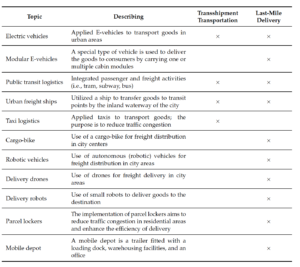A new paper by Zhangyuan and Haasis (2020) in Sustainability aims to construct a theoretical research framework for sustainable urban freight transport (SUFT) from the perspectives of future urban development and distribution innovations and appropriate research methods are discussed, as well. Urban freight transport plays a critical role in the promotion of sustainable and livable cities.
According to the literature review, considerable research on SUFT has focused on resolving some specific problems with a short-term perspective. The existence of an urban freight transport strategy is noted, which should be embedded in an overall sustainable development strategy with a long-term perspective (approximately 20–30 years). Nevertheless, considerable research has paid scant attention to the long-term planning of SUFT. The paper contributes to the closure of this gap.
First, the paper presents a systematic literature review (SLR) to highlight published papers involving foresight research within the past 16 years (2003–2018). This step contributes to the understanding of research methods that can be used in foresight research. Both exogenous (city development) and endogenous (distribution innovations) trends of UFT have exacerbated the challenges of the conventional urban freight network from a long-term perspective. This finding reveals that much research has hardly employed foresight methods to investigate future sustainable urban freight transport. Applying foresight research methods is an efficient solution for researching sustainable urban logistics from exogenous and endogenous tendencies.
Subsequently, the paper discusses the impacts of both urban development and distribution innovations on future SUFT, and these effects are used to select the appropriate methods to construct the theoretical research framework. Because exogenous and endogenous trends have interlocking and complex components in urban freight planning, selecting appropriate research methods is a critical step for constructing a framework.
Finally, the theoretical research framework of long-term planning for SUFT is developed on the basis of two future perspectives: the trends of urban development and the application of urban distribution innovations. This framework is intended to provide an approach to designing sustainable urban logistics, taking into account urban development and distribution innovations.

